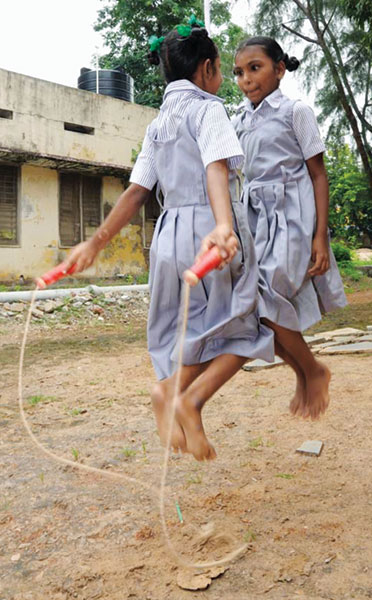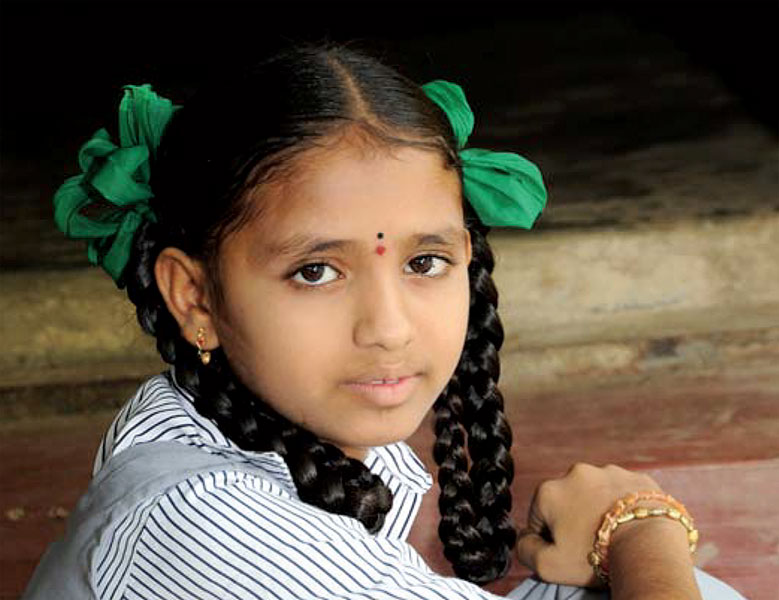Returning their childhood Pulling children out of a factory or any other workplace is not easy, but these Rotarians from RC Guntur Aadarsh have done that, and more.
When the young woman, a qualified engineer who works in Nagarjuna Electricals, was asked what was the one major difference in her life before she was educated — she hails from a local slum — and after education, her reply rings with me even today. She said “Previously they called me Lachhi … a name reserved for household maids, but now they call me Lakshmi!” This she said before the State’s Education Minister at a meeting. The connotation to the Hindu goddess of wealth cannot be missed.
Adds PDG Rajyalakshmi Vadlamani, D 3150 and a Trustee of the Change Makers Foundation which runs the Child And Police Project (CAP), that has set up a home-cum-bridge school for girls like Lakshmi, and was instrumental in this transformation: “I felt even more happy when she added, ‘And today, I can sit next to Ma’am,’ meaning me. Now these girls have the confidence to sit next to us. Earlier they used to sit down on the floor.” Lakshmi is married to an engineer and has two children.
Lakshmi was among the 5,000 children from Guntur’s slums who were pulled out of child labour after hectic parleys with parents to convince them that the children deserved a better future with decent education.
Now these girls have the confidence to sit next to us. Earlier they used to sit down on the floor.
She says that in the year 2000 this programme was started by the Reddy Foundation with the help of the city police department, and the DPEP (District Primary Education Programme), with the intervention of the State coming in through the Sarva Siksha Abhiyan. Helped by philanthropists of Guntur, NGOs and well wishers, Rotary Club of Guntur Aadarsh, of which Rajyalakshmi is a member, embraced the project. Initially this facility was set up as a non-residential bridge school, with the primary objective of disengaging children from hazardous labour conditions. Eight camps, each lasting 6 months, were conducted and over 800 children were put into mainstream schools till March 2004. But since then, a residential school has been started. So far eight one year “camps” have been conducted and 560 children have been given back their childhood, by pulling them out of work and putting them into schools. Currently this facility has 40 children, including 15 tribals.
Rajyalakshmi gives credit for this project’s success to the hard work done by Kolli Sarada — Ex Mayor of Guntur Municipal Corporation, B Rama Devi, a teacher from the Art of Living and Rotarians Dr K Padmaja, Sunita Mattupalli and Maddi Madhavi. She says between 2000–2016, over 3,000 girls were disengaged from child labour thanks to this bridge school and admitted into mainstream education. “These girls are regularly monitored by us for two years, and those who are capable and interested in pursuing higher education are financially supported by us.”
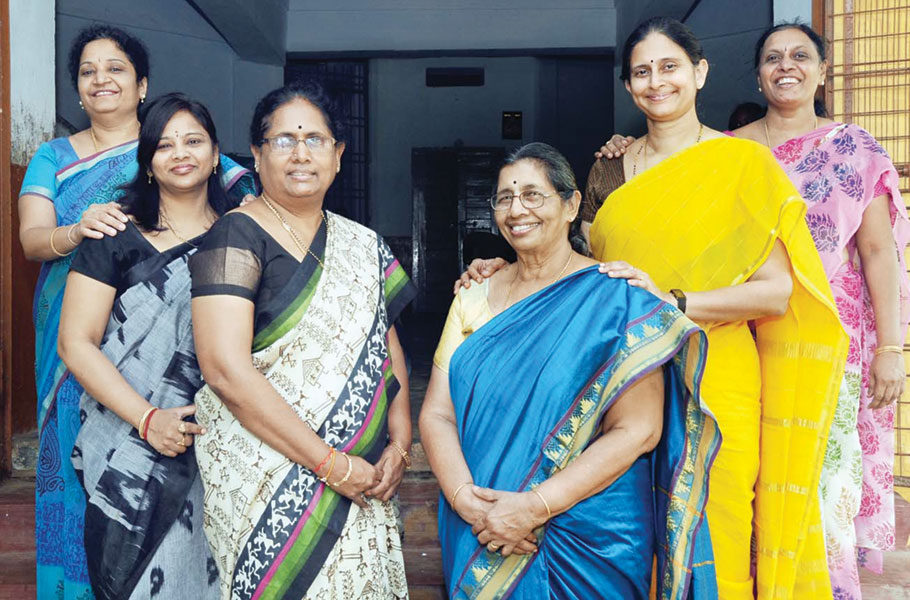
Of these, about half have gone in for higher education and 1,500 girls are successfully employed after completing their education. Other success stories are of Venkataratnam, a mechanical engineer, who is now employed as a lecturer in an Engineering College at Hyderabad. Earlier he worked in the fields as a labourer. Naszeera, who was working in the mirchi yard is now an advocate practicing in a Guntur Sub Court and Rama Devi has qualified as a physiotherapist and now works as a Police Constable in the Crime Branch. Earlier she was a housemaid.
A difficult journey
But it wasn’t an easy journey, because as Magsaysay Award winner Shanta Sinha pointed out at the Rotary South Asia Literacy meet last year, there are several complications in taking children out of labour and putting them into schools.
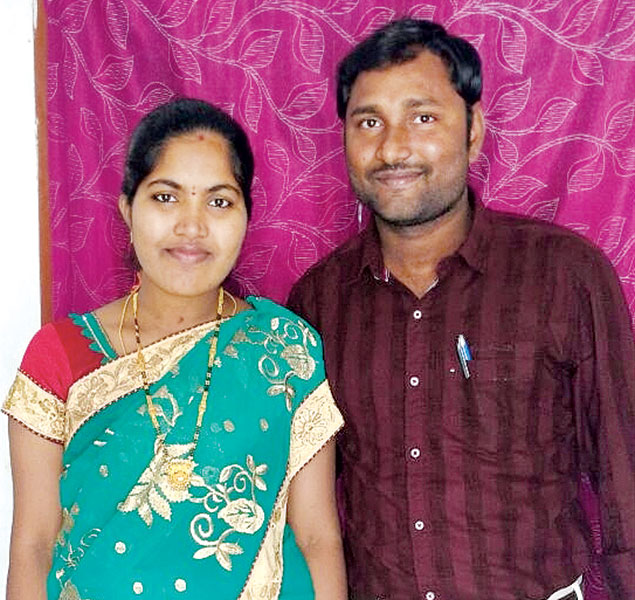
For Rajyalakshmi and three other women Rotarians from RC Guntur, this journey began some 15 years ago when they went for a training course to train trainers. “But once we went there and did the training we thought why only confine ourselves to training the trainers. Why not use this expertise directly and do something ourselves so that we give better education to at least some poor children.”
At their training session they were taught how to counsel both the parents and children to free the latter from child labour; “first the parents have to be counselled that this is best for the child and then you have to convince the child and bring her to our campus,” she says.
Parents retort: ‘What do you mean they’re losing their childhood? They get an off day and Rs 20-30.’
Once they had succeeded in doing this, “we picked up the teacher from the same slum so she knew exactly what the child’s behaviour pattern is and trained her.”
Rajyalakshmi clarifies that at the initial stage academics are not of importance. “We are looking then only for a friendly face and motherly affection in the woman and then we train her to give the child a feel of education. For one month they just get to know each other; only after that there is any talk of learning.”
The beginning
To begin with, she and the other Rotarians went every evening for a whole month from slum to slum in Guntur, and talked to parents on the need to take their children out of companies or factories and send them to their facility for some learning. It is not that these children have not seen the inside of a school; most of them go to school till they are 8 or 9, thanks mainly to the midday meals provided by the Government in schools. But when the child is old enough to work, the parents weigh the economics of pulling them out of school and send them to work. “Usually a child studies up to Class 2 or 3, and then is sent to work. It is really shocking to listen to the parents’ stories, and their accounting systems … 6 children means so much money. But when they say this we tell them that you are losing the child,” says Rajyalakshmi.
Not that parents take kindly to such words! “Many retort: ‘What do you mean we are losing the child? The child gets everything, a weekly holiday with Rs 20 to 30 to go out and enjoy herself.’”
The child gets a daily wage between Rs 60-100, depending on the work. For instance, those working in a cotton mill get Rs 60–80 a day. “But if they go to the mirchi (chillies) yard for plucking chillies, they’ll get Rs 100. And those working in ginning mills get even more.”
It is horrifying to listen to her describing how the much younger children go to work at ginning mills. Shockingly, the work here “is structured like a game. All that the child has to do is to take the cotton in both his/her hands and throw it at the machine; in this process the seeds in the cotton get scattered.”
But what the scattered seeds do to the child’s respiratory system, or eyes, is nothing short of horrifying.
Shockingly, the work in ginning mills is structured like a game. The child has to take the cotton in both his/her hands and throw it at the machine.
Once the parents are convinced, “we take the police with us to the companies to get the children released.” Slowly the child is weaned away and put into mainstream education, with which they are fortunately familiar having attended school till class 2 or 3, mainly for the midday meal. But once the child is capable of working and getting a daily wage, the noon meal doesn’t matter any longer in the family’s economics.
In the residential school, the children are tutored, their academics improved to the level of a regular school and then they are shifted. Those who do well and are willing to go to college are helped. “We use our clout, influence and contacts to get them admissions, and help them financially. Some of them are so bright … over 30 of our students have becomes doctors, engineers, teachers, nurses etc and are placed in well-paying jobs in Guntur,” she says.
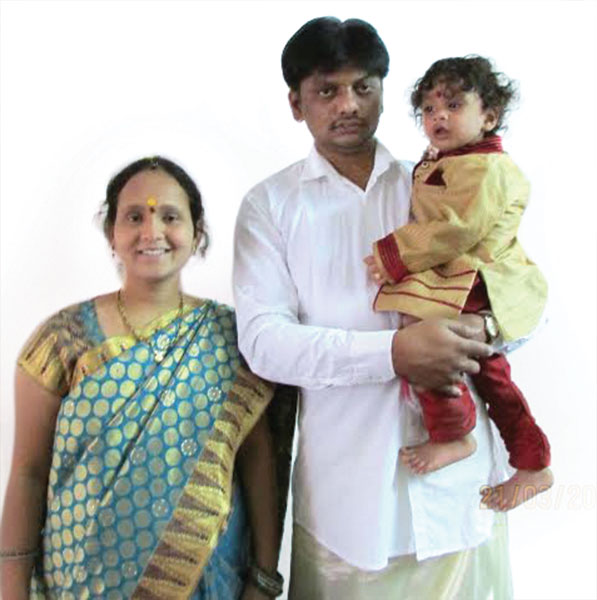
CAP has till date removed 5,000 people from labour, and has come a long way from the day when Rajyalakshmi had this encounter with a mother. All her 5 daughters were working and “I asked her to give me at least three of her daughters to be sent to school. She said, what do you mean by give me three girls? They all work in turns. If the eldest one goes to work, the second one cooks, the other two clean the house etc. Each girl works by turn and is treated like a queen, and they get holiday and Rs 20–30 to go out and spend as they want. What more do they need?”
But now watching the progress some of the girls have made, the jobs they hold, the parents’ attitude to education is changing slowly.

